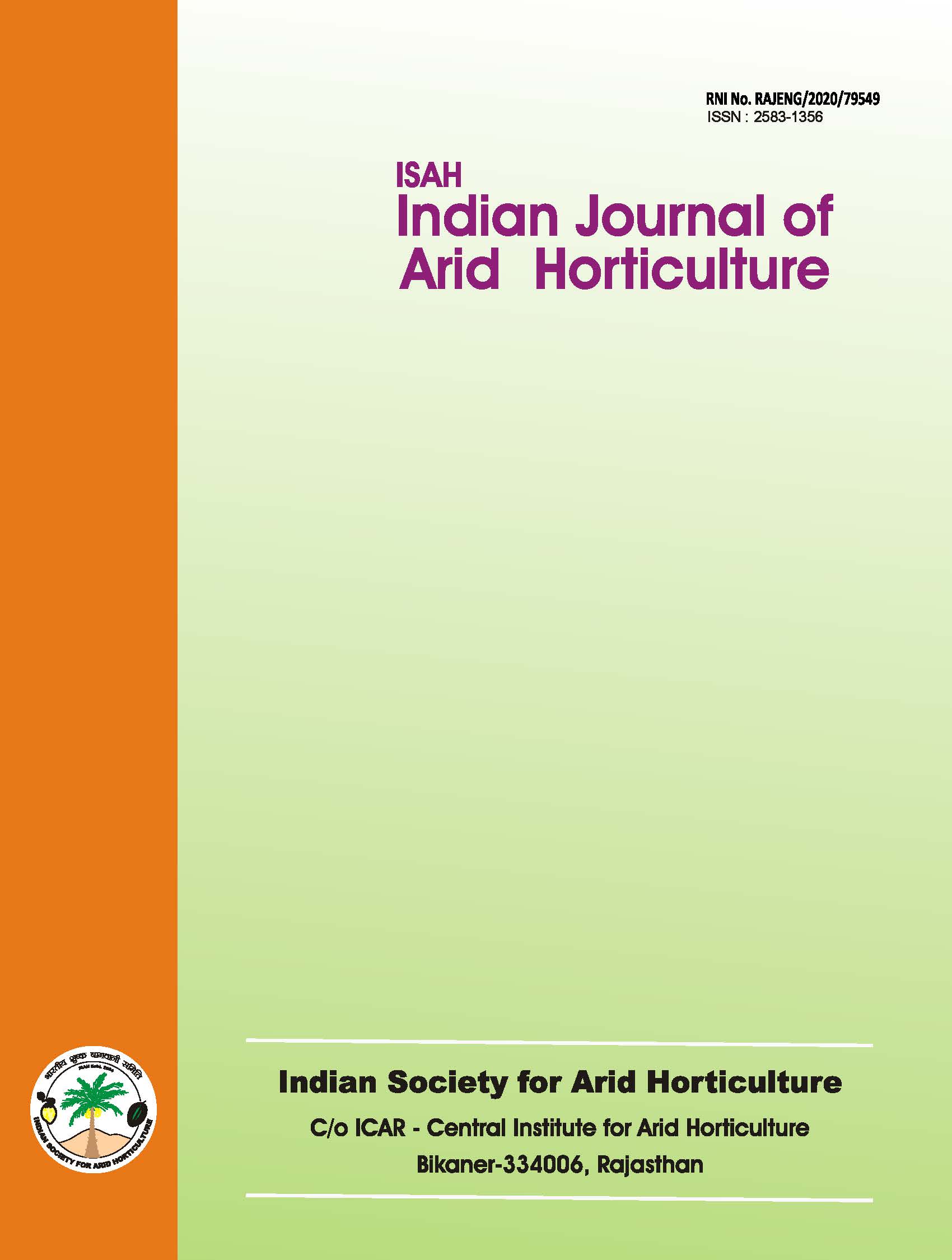Genetic diversity in phalsa (Grewia subinaequalis D.C.) under semi- arid ecosystem of western India
Keywords:
Acidity, divergence, fruit set, geneticAbstract
An investigation was undertaken to evaluate the performance of 10 genotypes of phalsa at experimental farm of Central Horticultural Experiment Station (ICAR-CIAH), Vejalpur, Panchmahal (Godhra), Gujarat under rainfed hot semi-arid ecosystem of western India during 2015 and 2016. These genotypes were studied to observe the variability in respect to flowering, fruiting and fruit quality attributes under hot semi-arid conditions. The period of full bloom was recorded in February and March in all the genotypes. Fruit set percent was noted highest (58.53) in CHESP-9, whereas fruit ripening started from 1" week of April and continued up to 1" week of May in different genotypes. Flower length, flower breadth, calyx tube length, calyx tube breadth, petal length, petal breadth, stamen length, ovary length and ovary breadth ranged between 25.30-30.20mm, 60.15-69.18mm, 3.64- 4.18mm, 4.63-5.22 mm, 7.89-8.25mm, 4.95-5.21mm, 8.84-9.94 mm, 3.94-4.16 mm, 7.00-7.15mm respectively. The maximum fruit yield (3.28 kg/ plant), TSS (20.12o Brix), total sugar (12.42% was recorded in CHESJ-9. Based on the various desired horticultural traits, the genotypes, CHESP-9 and CHESP-7 were found to be promising.
Downloads
References
AOAC. 1980. Official Methods of Analysis of Association of
Official Agricultural Chemists, Association of Official Agricultural Chemists, Benjamin Franklin Station, Washington, DC, USA.
Gomez, K. A. and Gomez, A. A.1984. Statistical Procedure for Agricultural Research (2nd Edn.), John Wiley
and Sos Inc., New York.
Malik, S. K., Choudhary, Ravish, Kumar, S., Dhariwal, O.
P., Deswal, R. P. S. and Chaudhary, R. 2012. Socio- economic and horticultural potential of Khirni [Manilkara hexandra (Roxb.) Dubard]: a promising underutilized fruit species of India. Genetic Reso. Crop. Evol., 59:1255-65. Malik, S. K., Kumar, S., Choudhary, Ravish, Kole, P.R.,
Chaudhary, R. and Bhat, K.V. 2013. Assessment of genetic diversity in khirni [Manilkara hexandra (Roxb.) Dubard]:An important underutilized fruit species of India using random amplified polymorphic DNA markers. Indian J. Hort., 70:
Patel, V. B., Pandey, S. N., Singh, S. K. and Das, Bikash, 2005. Variability in jamun (Syzygium cuminii Skeels) accessions from Uttar Pradesh and Jharkhand. Indian J. Hort., 62:244-47.
Singh, A. K., Singh, Sanjay, Singh, R. S., Joshi, H. K. and Sharma, S. K. 2014. Characterization of bael (Aegle marmelos) varieties under rainfed hot semi-arid environment of western India. Indian J. Agric. Sci., 84:1236-42.
Singh, Sanjay and Singh, A. K. 2005. Genetic diversity in mahua (Bassia latifolia) under semi arid ecosystem of Gujarat. Indian J. Agric. Sci., 75: 519-23.
Singh, Sanjay, Singh, A. K. and Apparao, V. V. 2006. Genetic diversity in Chironji (Buchanania lanzan Spreng) under semi arid ecosystem of Gujarat. Indian J. Agric. Sci., 76:695-698.
Singh, Sanjay Joshi, H. K., Singh, A. K., Lenin, V., Bagle, B. G. and Dhandar, D. G. 2007. Reproductive biology of jamun (Syzygium cuminii Skeels) under semi-arid
tropics of Western India. Hortic. J., 20:76-80.
Singh, Sanjay, Singh, A. K. and Joshi, H. K. 2008. Genetic
variability for floral traits and yield attributes in tamarind. Indian J. Hort,. 65: 328-331. Singh, Sanjay, Singh, A. K., Joshi, H. K., Lata, K., Sisodia, P. S. and Bagle, B. G. 2010. Floral biology studies in Buchanania under semi-arid ecosystem of western India. Indian J. Hort., 67:161-68.
Singh, S. and Singh, A. K. 2012. Studies on variability in jamun (Syzygium cuminii Skeels) from Gujarat.
Asian J. Hort., 7: 186-189.
Singh, Sanjay, Singh, A. K., Appa Rao, V. V. and Bhargava,
R. 2016 a. Genetic divergence in chironji (Buchanania lanzan) under semi-arid ecosystem of western India. Indian J. Agric. Sci., 86: 550-55.
Singh, Sanjay, Singh, A. K., Appa Rao, V. V. and Bhargava, R. 2016b. Genetic divergence in khirni [Manilkara hexandra (Roxb.) Dubard] under semi-arid ecosystem of western India. Indian J. Agric. Sci., 86: 337-41. Yadav, V., Singh, A. K., Singh, Sanjay and Appa Rao, V. V. 2017. Variability in custard apple (Annona squamosa) genotypes for quality characters from Gujarat. Indian J. Agric. Sci., 87:1627-32.

